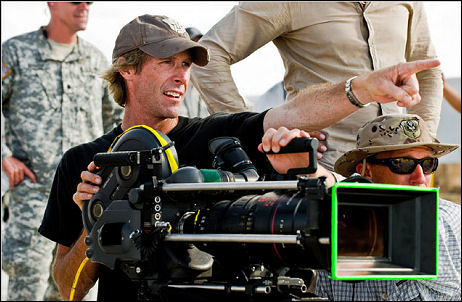My favorite shot is the water-in-a-glass tipping into a steep angle.
Day: August 24, 2009
Waltz’s Assurance
The Envelope/Gold Derby‘s Tom O’Neill reports that while Harvey Weinstein intends to use a “last-minute, ambush strategy” for Rob Marshall‘s Nine, he plans to use the Crash campaign model for Inglourious Basterds.
“Because the DVD will be a mass release, it won’t need to be watermarked with numerals identifying each disc with the name of an academy member or other award voter,” O’Neill writes. “That’s one of the sneaky ways Crash beat front-runner Brokeback Mountain for best picture of 2005 — Lionsgate blitzed Hollywood with more than 120,000 cheap DVDs.”
The only Inglourious Basterds Oscar nomination that’s going to happen is Christoph Waltz for Best Supporting Actor — end of story. Harvey can blanket Hollywood with DVDs to make sure this happens, but isn’t Waltz’s nomination already pasted into most people’s heads? Tarantino’s screenplay hasn’t a prayer of being nominated for Best Original Screenplay. Not with that damn baseball-bat/brain-matter scene. Gran Shaggy Poo sez the over-50s ain’t goin’ for it.
Early TIFF Screenings…Please?
Only two weeks and two days before the Toronto Film Festival begins on Thursday, 9.10 (which requires flying there and getting all set up on Wednesday, 9.9). New York-based producers and distributors know what goes, but I’m reminding everyone anyway that people like me tend to see maybe 25 films during the festival and that I now have about 33 films on my list not counting the two or three unexpected “finds” that you always hear about and want to squeeze in during any festival. So please get in touch if there’s anything to be seen here in Manhattan between now and Tuesday, 9.8. I won’t post until the festival begins but I really need to see as much as possible before it starts.
My 8.14 tally came to 34. I added Catherine Corsini‘s Partir but scratched Jan Kounen‘s Coco Before Chanel (saw the trailer…yeesh) and Carlos Saura‘s I, Don Giovanni, leaving a total of 33. So I’m most likely going to miss at least eight of these and possibly more…who knows how it’s going to go?
Mulligan vs. Streep
Here’s my two cents about Roger Friedman‘s 8.21 piece assessing the leading Best Actress contenders of the moment. Right now it’s a two-actress race — Carey Mulligan in An Education vs. Meryl Streep in Julie & Julia (with possible fortification coming from her It’s Complicated performance.). Obviously there are four months to go and anything can happen, but right now the Oscar is Mulligan’s to lose because of (a) the old “Streep nominated again?” factor and (b) Mullligan’s performance is delightful/exciting while Streep’s is merely expert.




(l. to r,.) Carey Mulligan, Meryl Streep, Abbie Conrish, Penelope Cruz
Mulligan might very well not win because Oscar tradition has generally been about ingenues being nominated but not winning because they have to pay their dues and all that jazz. It would actually be cooler for Mulligan to just have fun with the nomination dance and boost An Education in the bargain, etc.
Abbie Cornish might manage a Best Actress nomination in for her performance in Bright Star, although she’s looking like a bit of a weak sister at this stage. (The movie’s real star is Jane Campion.) Nobody knows anything about Rachel Weisz in The Lovely Bones so just shut up and wait. Forget Penelope Cruz in Broken Embraces (although I think she’s wonderful in this film) because the reaction to Pedro Almodovar‘s latest has been tepid since Cannes. Forget Zooey Deschanel in 500 Days of Summer…just forget it. (You can’t be nominated for playing a whimsical, self-absorbed ditzoid.) And forget Gwynneth Paltrow in Two Lovers….not happening!
Friedman, by the way, says that Mulligan is the breakout star among his list of nominees and then adds, “Remember, you heard it here first.” That’s funny. I seem to recall some other guy jumping up and down about her last January and predicting that An Education “will definitely be in contention at the end of the year” in some capacity.
Inglourious Zombies
“The debate over the public option has been depressing in its inanity,” writes N.Y. Times Paul Krugman in today’s (8.24) edition. “Opponents of the option — not just Republicans, but Democrats like Senator Kent Conrad and Senator Ben Nelson — have offered no coherent arguments against it. Mr. Nelson has warned ominously that if the option were available, Americans would choose it over private insurance — which he treats as a self-evidently bad thing, rather than as what should happen if the government plan was, in fact, better than what private insurers offer.
“But it’s much the same on other fronts. Efforts to strengthen bank regulation appear to be losing steam, as opponents of reform declare that more regulation would lead to less financial innovation — this just months after the wonders of innovation brought our financial system to the edge of collapse, a collapse that was averted only with huge infusions of taxpayer funds.
“So why won’t these zombie ideas die?
“Part of the answer is that there’s a lot of money behind them. ‘It is difficult to get a man to understand something,’ said Upton Sinclair, ‘when his salary’ — or, I would add, his campaign contribution fund — ‘depends upon his not understanding it.’ Vast amounts of insurance industry money have been flowing to obstructionist Democrats like Mr. Nelson and Senator Max Baucus, whose Gang of Six negotiations have been a crucial roadblock to legislation.
“But some of the blame also must rest with President Obama, who famously praised Ronald Reagan during the Democratic primary, and hasn’t used the bully pulpit to confront government-is-bad fundamentalism. That’s ironic, in a way, since a large part of what made Reagan so effective, for better or for worse, was the fact that he sought to change America’s thinking as well as its tax code.
“How will this all work out? I don’t know. But it’s hard to avoid the sense that a crucial opportunity is being missed, that we’re at what should be a turning point but are failing to make the turn.”
40ish White-Guy Club
“If you are splashing around with a bunch of guys who are 93 percent white, an average of 45.62 years old and look as if they’ve done this before, you must be swimming in the studio directors’ pool,” wrote Michael Cieply in yesterday’s (8.23) N.Y. Times.

“Such is the profile of studio filmmakers, based on a survey of those who directed the 85 or so live action movies that have been released, or will be, in 2009 by the six biggest film companies — Paramount Pictures, Sony Pictures Entertainment, 20th Century Fox, Universal Pictures, Walt Disney Studios and Warner Brothers.
Cieply’s tally “does not count animated films, which are born by a different, more collaborative process, or the independent-style movies released by specialty divisions like Fox Searchlight Pictures or Focus Features.
“Rather, it is a scan of what is on the big studio schedules: comedies like The Hangover from Todd Phillips and I Love You, Man from John Hamburg; action films like Fast & Furious from Justin Lin and Transformers: Revenge of the Fallen from Michael Bay; and the increasingly rare drama, like Shutter Island, which was on tap for October from Martin Scorsese (but has just been moved into 2010).
“What the count shows is that Hollywood directors are pretty much what they have always been: a small brotherhood of highly skilled craftsmen — more than 90 percent this year are men — who could hit or miss with any given film, but who tend to have solid experience. This year’s directors appear to have made 6.1 movies, on average — and probably have more in common with one another than with the increasingly diverse population around them.

“There’s no single process or pattern for deciding who will direct any given picture. The choices are born of an often awkward consensus among executives and producers, with plenty of lobbying from agents and occasional input from the movie’s stars. A filmmaker might write an attractive script and then insist on directing it as a condition of sale, or could simply be hired based on a great track record.
“Though Hollywood’s power structure remains heavily white, it has opened the ranks to far more women in recent years. But that shift does not yet appear to have changed the makeup of the studio directing pool.”
Last Word on Basterds
The moral basis in Inglourious Basterds for the Basterds’ delicious slaughter of German troops is that said troops were serving an evil criminal regime and therefore THEY, the troops, were evil and criminal as well as viciously anti-Semitic, so snuff ’em out like rats. Shoot ’em, club ’em, exterminate ’em.
IGB is basically a table-turning game in which Tarantino decided to have fun by letting Germans suffer en masse the way Jews suffered en masse at the hands of the SS and other Nazi command types who carried out the Holocaust.
It is still shocking news to some ostrich-heads out there that Americans were the bad guys in the Vietnam War (i.e., a great industrial nation coming down full-force upon a peasant society and calling out the furies), and that by this token the troops who served this policy were bad guys as well, or even, if you want to really fulminate and get angry about it, just as bad as average German grunts were “bad” for serving their side during WWII.
Grunts are grunts. They don’t formulate policy. They sign up and go through basic training and shoot the enemy and try to survive so they can come back to their families. But by the standards of some, U.S. grunts were okay and just trying to get through the Vietnam War — regular guys, one of us, etc. — but German grunts were evil and deserved to be slaughtered with baseball bats. What myopic idiocy!
IGB is playing a facile, cheap and repugnant game. Two vicious wrongs really don’t make a right, guys. And by relishing the idea of slaughtering average-Joe Germans — by revelling in their elimination like cheering baseball fans in the bleachers — Tarantino degrades the morality of Jewish survivors…indeed, the moral residue of the entire horrific Holocaust experience.
And form-wise, Inglourious Basterds is taken up by at least three if not four long scenes in which a suspicious German goes on at length about how a certain neutral or Allied-friendly Frenchman or French-woman or Brit seems to be not telling the truth and “can you explain why?” and “may I have another glass of your delicious milk?” and lah lah lah lah. The applicable terms are “repetitive” and “boring.”
I know exactly what I’m talking about. I know exactly what Inglorious Basterds is. It is third-rate, scraping-the-bottom-of-the-barrel Tarantino. And just because the HE hoi polloi are calling it cool and telling their friends to go see it doesn’t invalidate my view. I haven’t been a movie maniac all my life and a regular column writer since 1994 for nothing. I know what goes. I mean, I know.
So all you IGB hooligans can just retire to a pub somewhere and arrogantly chortle about how popular the film is all on your own. Have a good time, enjoy yourselves, etc. Due respect but I don’t agree with you, and if you want to know the truth I don’t truly respect your cinematic value system either. I mean, I do in a sense — no one is “right” and everybody has their opinion — but I think it’s pretty obvious what it’s all about.
And that goes for you too, Glenn Kenny! IGB is smug, low-grade, wafer-thin cinematic shite. It’s popular because it allows the pseudo-hip to fancy themselves as genuinely hip by winking at them over and over and saying, “Get it guys? It’s just a movie. We’re just havin’ fun with the WWII mythology! Yeaaahhh!”
Note: I just tapped out the above diatribe in the HE reader comments section, and figured it would get more play if I posted it as a front-page rant.
Basterds Sequel
An HE reader who’s friendly with an LA movie buddy of mine wrote the following over the weekend: “My Dad and I saw Inglourious Basterds, which we loved. I’m so mad at the critics for thinking the movie is too violent or cruel, or Wells’ whole diatribe about the Basterds behaving no better than the Nazis they’re after. It’s a movie! Let’s have fun! If we can’t laugh at Nazis, what can we laugh at?.”

Wells response: It’s a movie! Have fun with the fake Nazis! Club their heads in for refusing to betray their friends….hoo-hoo!
Except I’m just wondering what this guy and his dad will think of Tarantino’s rumored sequel, Inglourious Vietnamese Basterds. D’ju read about it? It’s about an elite team of ornery North Vietnamese hillbilly badasses sent into South Vietnam in early ’68 to kill a whole bunch of no-good Americans and deliver some payback for torchin’ all those villages and slaughterin’ non-combatants who won’t give up the Vietcong.
The rockin’ first-act highlight comes when head Basterd Lambo Nguyen tells Sgt. Ernest Taylor of Middletown, Connecticut, that unless he provides information about a nearby company of American soldiers that the craziest Basterd of all, Wham-bam Phan, will beat his skull into mush with a baseball bat. Alas, the stubborn Taylor refuses to betray his buddies, and when Wham-Bam Phan lets him have it….whoa! Very cool! Blood and brain matter mixed with the jungle grass, and covered with insects in minutes!
